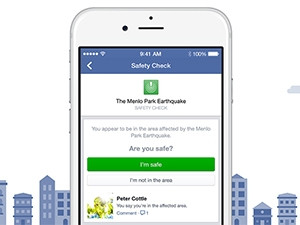
Facebook vowed yesterday to turn on its Safety Check feature more often during disasters, in response to growing criticism of Western bias, after it enabled the function after the attacks in Paris.
In the wake of the deadliest attack on Europe in over a decade that killed at least 129 people and injured many more, millions of people used Facebook's Safety Check tool to tell their friends and family they were safe.
The feature, launched last year, works by triggering a push notification on devices that are near an affected area.
Users on the social media platform criticised Facebook for not mobilising the same safety function during other attacks around the world, especially after suicide bombings in Beirut a day earlier that killed at least 43 people.
"Many people have rightfully asked why we turned on Safety Check for Paris but not for bombings in Beirut and other places," said Facebook CEO Mark Zuckerberg on his official account.
"Until yesterday, our policy was only to activate Safety Check for natural disasters. We just changed this and now plan to activate Safety Check for more human disasters going forward as well."
But many users were not satisfied with Zuckerberg's statement, accusing the social media platform of caring more about certain parts of the world.
"It is absurd to say that if a person or organisation expresses solidarity with Paris, then they touted not sympathising with Beirut," says World Wide Worx MD Arthur Goldstuck. "There is a 'political-correctness' creeping into the expression of sympathy.
"Those who are calling out people for expressing solidarity with a cause and not another, are undermining their own cause. It shows they are more concerned with the politics of sympathy than actual sympathy."
Alex Schultz, Facebook VP of growth, explained in a blog post the feature can only be activated when there is a clear start and end point to the crisis or natural disaster.
"During an ongoing crisis, like war or epidemic, Safety Check in its current form is not that useful for people: because there isn't a clear start or end point and, unfortunately, it's impossible to know when someone is truly 'safe'."
Facebook "appears to be trying to help out and are responding to user feedback but their goodwill in this situation may not be received in the way they intended," Gartner analyst Brian Blau told Gigaom.
"I don't see their Safety Check as trying to replace official government efforts to help those impacted by the tragedy, but in [an] awkward way people are assuming their efforts to [be] nefarious in nature, and I just don't think that is the case. I'm sure they feel some responsibility to help their users communicate given they are so popular globally."
The stats
More than four million Facebook users checked themselves as safe in Paris during the first 24 hours following the attacks, a Facebook representative told Mashable. And 360 million people around the world received notifications that their friends were safe.
In France, there are 23.4 million Facebook users and in Lebanon there is a Facebook population of 1.5 million.
Goldstuck says Facebook's Safety Check is premised on a large user base. "The Paris attacks were an obvious place to test out the feature (previously only used in natural disasters) because of its scale and worldwide visibility. Facebook normally tests out new features in major markets.
"Crying discrimination on such a feature is not taking the moral high ground, but merely shouting from a social soapbox."
Tech companies get involved
Online home-rental marketplace Airbnb, which held its annual host convention in Paris a day before the attacks, activated its disaster relief programme, enabling people displaced in Paris to stay with certain Airbnb hosts for free. The hashtag #PorteOuverte (open door) was used on Twitter by Airbnb hosts and other Parisians to let people know their homes were open.
Online retailers and services, including Amazon.com, Reddit, Tumblr and YouTube, also displayed French flags on their homepages to pay tribute to the victims of the Paris attack.
Telecom companies, including Sprint, T-Mobile and Verizon, offered a free calling and texting service between France and the US. Google allowed free use of its Hangouts, a unified communications service, and so did Skype.
Share